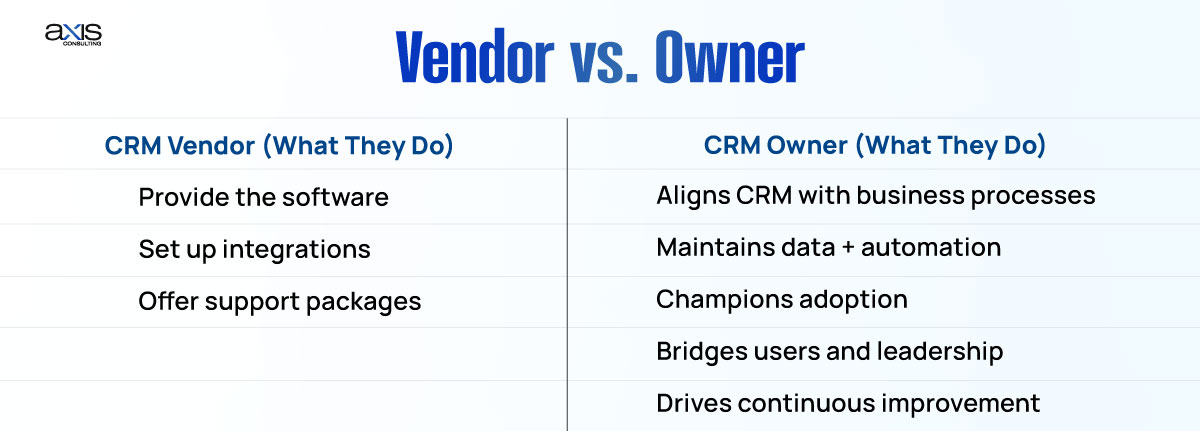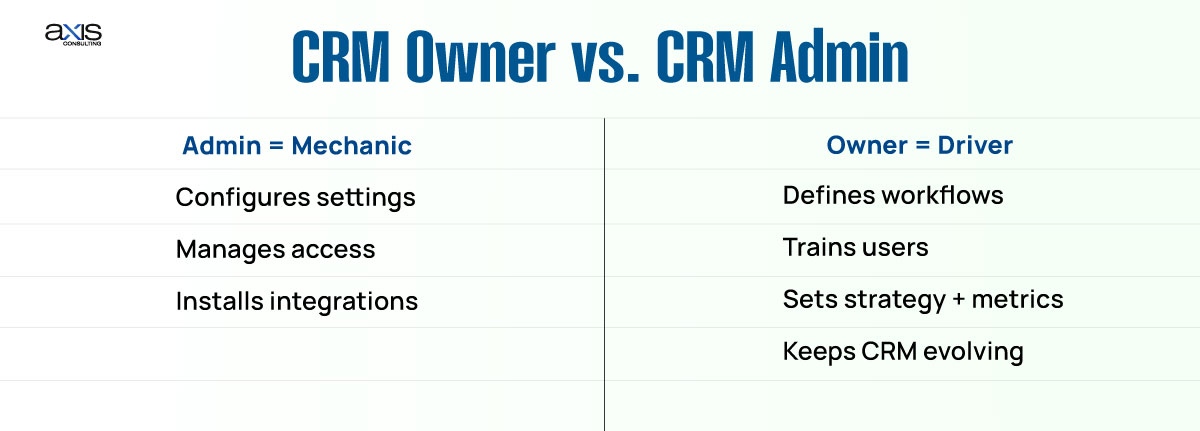You bought the right CRM. The sales deck looked great. The onboarding went smoothly. The integrations are working. So, why is no one using it correctly? The answer is simple: you have a CRM vendor, but you lack a dedicated CRM owner.
Your vendor gave you the platform. Your team has access. But no one is actively steering the system. Without ownership, even the best CRM becomes an underused tool filled with inconsistent data, neglected automation, and frustrated users. Buying a CRM is not enough. Someone must own it.
Table of Contents
ToggleWhat is a CRM Owner?
A CRM owner is not the same as a support representative. It is not just the admin who adds users or resets passwords. It is a strategic, cross-functional role that ensures your CRM works for the business, not just the software. The CRM owner is responsible for:
- Aligning the CRM with your sales, marketing, and service processes
- Defining how the system is used across teams
- Keeping data clean, workflows sharp, and automation relevant
- Championing adoption and continuous improvement
- Acting as the bridge between users and leadership
This person treats the CRM as a living system. Not just a tool but a business-critical platform that needs structure, strategy, and care.
Why CRM Vendors Can’t Fill the Ownership Gap?

Your CRM vendor can assist you in setting up these systems. They might even offer support packages, onboarding services, or custom configurations. However, they are not familiar with your business. They are not in your team meetings, they do not see your pipeline struggles, and they cannot speak for your revenue goals. A vendor sells software. A CRM owner makes the system support your business outcomes.
Without someone internally owning the system, your CRM becomes a passive database. It gets bloated with insufficient data, misused fields, outdated reports, and forgotten automations. No vendor can fix what you do not actively manage.
The Cost of Not Having a CRM Owner
When no one owns the CRM, ownership defaults to “everyone,” which means it becomes no one’s job. Reps use it differently. Data gets messy. Automation breaks quietly. And reporting loses all accuracy. The results?
- Pipeline reviews based on inaccurate data
- Frustrated managers who cannot coach effectively
- Leadership flying blind with dire forecasts
- Teams reverting to spreadsheets and emails
- A CRM that becomes a burden instead of a solution
This chaos leads to lost deals, wasted time, and missed opportunities. All because no one is in charge.
What a Great CRM Owner Does?

A real CRM owner does more than manage users or permissions. They shape the system around the way your business operates and evolves. Here’s what the role looks like in action:
- Audit usage monthly to find broken workflows or unused features
- Trains new hires on CRM best practices and naming conventions
- Creates documentation that keeps processes standardized
- Builds automation that saves reps’ time and ensures consistency
- Meets with stakeholders across sales, marketing, and support to align the tool with team needs
- Surface insights for leadership with clean, reliable reports
They make sure the CRM works for everyone without becoming a free-for-all.
CRM Owner vs. CRM Admin: What’s the Difference?

An admin handles the technical aspects. They configure settings, install integrations, and manage access. These are essential tasks, but they are not enough.
A CRM owner goes beyond setup. They own the why, the how, and the what happens next. They lead the CRM’s evolution in sync with business strategy. They’re thinking about scalability, workflow optimization, and adoption across departments. Think of the CRM admin as the mechanic. The CRM owner is the driver with the map, steering the business toward results.
How a CRM Owner Transforms Sales Performance

When a CRM is owned with intention, sales get sharper. Deal stages are clear. Automations reduce manual tasks. Follow-ups happen on time. And reporting reflects reality, not guesses.
A CRM owner helps sales leaders coach more effectively. They ensure reps trust the data. They identify which parts of the funnel need attention and build workflows to improve deal flow. It’s not about more features. It’s about more clarity and control over the sales engine.
Why Marketing and Support Teams Benefit Too?
The CRM is not just for sales. Marketing needs lead data, campaign attribution, and nurture sequences to work properly. Customer success teams rely on contact history, service records, and account visibility to ensure effective customer support.
A CRM owner ensures the system works across departments. They create shared dashboards, align lifecycle stages, and help teams speak the same data language. When marketing, sales, and support align inside the CRM, the entire customer journey becomes smoother and far more scalable.
When to Hire or Appoint a CRM Owner
If your team has more than five users inside the CRM, you need an owner. If your sales process involves more than two stages, you need an owner. If multiple departments handle customer data, a designated owner is necessary to ensure consistency and accountability.
You can start by appointing someone part-time, usually a RevOps manager, experienced AE, or sales enablement lead. As you scale, you may need a full-time role, such as a CRM Operations Manager or Revenue Systems Strategist. The sooner you assign ownership, the sooner your CRM becomes a growth asset instead of a tech liability.
A CRM Without an Owner Is Just Software
You wouldn’t buy a race car and expect it to win without a driver. The same goes for your CRM. Without ownership, the tool becomes just another expense. However, with the right person at the helm, your CRM becomes a high-performance system that enhances alignment, accuracy, and results. Don’t wait for things to break. Assign a CRM owner now and give your systems the strategy they need to support your growth.
FAQs
Can a CRM vendor act as the owner of our system?
No. Vendors can support setup, but they can’t own your internal processes or business outcomes. That requires an internal leader.
Who should we appoint as our CRM owner?
Look for someone who understands your sales process, communicates across teams, and can manage systems. RevOps or sales enablement leaders are ideal.
How much time does CRM ownership require?
Part-time initially, growing to full-time as your team and CRM complexity grow. Monthly audits, regular updates, and team alignment are ongoing.
What happens if we don’t have a CRM owner?
Data gets messy. Reporting becomes unreliable. Teams get frustrated. And your CRM fails to deliver the ROI you expect.
Can CRM ownership be shared between departments?
Yes, but only if one person remains in charge. Collaboration is key, but someone must be accountable for strategy, consistency, and execution.